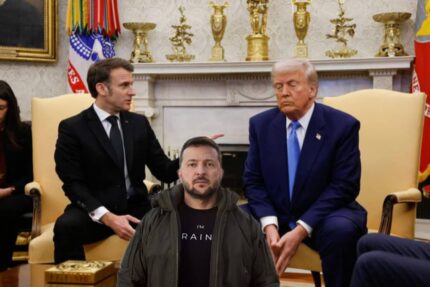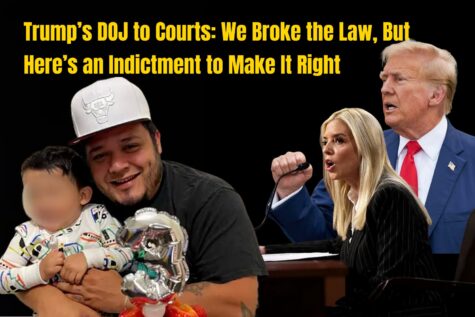During a high-stakes meeting at the White House, French President Emmanuel Macron reaffirmed that any peace deal in Ukraine must uphold the country’s sovereignty and security. Speaking alongside U.S. President Donald Trump, Macron cautioned that a rushed ceasefire without proper guarantees could amount to Ukraine’s surrender.
“This peace must not mean a surrender of Ukraine or a ceasefire without guarantees,” Macron stated. He emphasized that Europe had a crucial role in ensuring Ukraine’s long-term security, urging a strategic approach rather than a hasty settlement. Macron’s stance aligned with broader European concerns that any deal perceived as favoring Russia could embolden future aggression.
Trump’s Optimism and Economic Priorities
In contrast, President Donald expressed optimism about a potential resolution, suggesting that Russian President Vladimir Putin was open to European peacekeepers in Ukraine. Trump claimed he had personally raised the idea with Putin and was assured there would be no objection.
“He has no problem with it,” Trump asserted, adding that Russia was ready to negotiate an end to the war. However, donald also highlighted economic interests, revealing that his administration was in talks with Ukraine over a revenue-sharing agreement involving the country’s critical minerals. According to Trump, securing such a deal could serve as partial repayment for the billions of dollars the U.S. had provided in aid to Ukraine.
Diverging U.S. and European Positions
Despite the cordial nature of the meeting, significant policy differences between the U.S. and Europe became apparent. Just hours before Macron’s arrival, the U.S. voted against a United Nations resolution condemning Russia’s invasion of Ukraine—a resolution strongly backed by European nations.
Trump’s past comments further fueled tensions. The U.S. president had previously labeled Ukrainian President Volodymyr Zelenskyy a “dictator” and wrongly blamed Ukraine for provoking the war. Macron, in contrast, maintained a firm stance, repeatedly referring to Russia as the “aggressor” and stressing that peace could not come at the cost of Ukraine’s territorial integrity.
Disagreements Over Financial Aid and Burden Sharing
One of the more contentious moments came when Trump argued that Europe was only loaning money to Ukraine, while the U.S. was making irreversible financial commitments. Macron immediately corrected him, clarifying that Europe had provided 60% of total aid, including grants, loans, and military support.
“No, in fact, to be frank, we paid,” Macron interjected, touching Trump’s arm for emphasis. Trump, however, remained skeptical, replying, “If you believe that, it’s OK with me. But now we do.”
Trump’s insistence on European nations taking on a larger financial burden aligns with his long-standing skepticism toward NATO and transatlantic alliances. Macron, on the other hand, framed European support as a necessity for regional stability, not just a financial obligation.
Uncertainty Over Next Steps
While both leaders agreed on the need for peace, their approaches diverged significantly. Trump suggested that the war could end within weeks and announced potential meetings with both Zelenskyy and Putin. However, Macron warned against a weak agreement that could fail to secure Ukraine’s sovereignty in the long term.
“We want peace swiftly, but we don’t want an agreement that is weak,” Macron said, advocating for a structured truce followed by a comprehensive peace deal.
As diplomatic negotiations continue, Europe remains cautious of Trump’s direct engagement with Putin, fearing that a deal driven by economic interests rather than security guarantees could leave Ukraine vulnerable. Meanwhile, Trump’s outreach to both Russia and Ukraine signals a possible shift in U.S. foreign policy that could reshape the course of the war.














